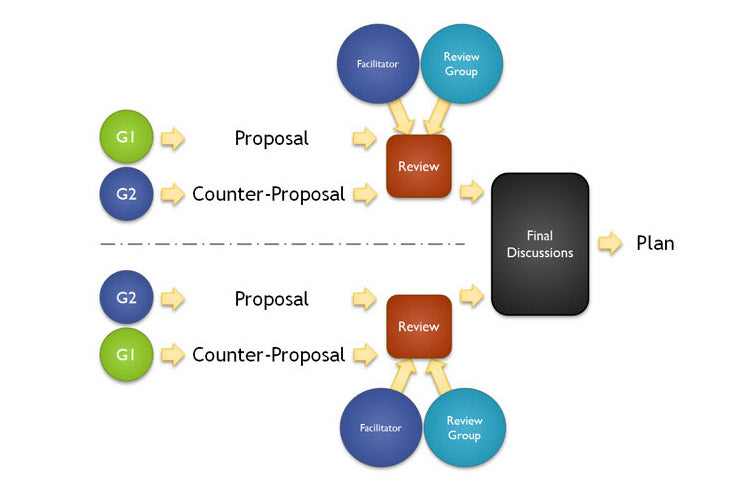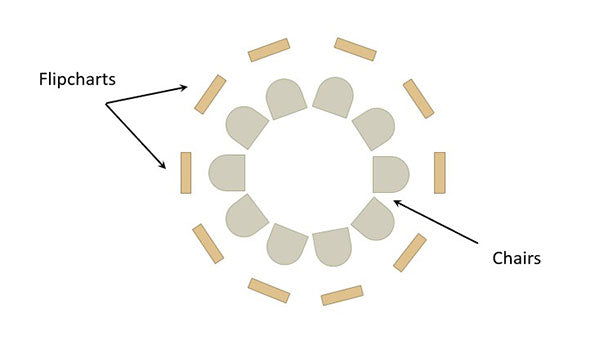Purpose
Sometimes it is important to scrutinise a plan to make sure it is valid. A common method used is known as Devil’s Advocate. This is basically an individual who has been given the role of an adverse critic. The aim is to look for problems, issues and anything that is inconsistent in a given plan.
The role is mainly negative and the danger is that the negativity can come to seriously undermine a potentially good idea. For this reason, an alternative method has been developed by Mason and Mitroff known as Dialectical Inquiry (Mason and Mitroff 1981).
In this exercise, delegates get to practice brainstorming using this particular method.
Objective
Two groups, known as proposal and counter-proposal, present their views to a review group. They will then work together to form a set of conclusions.
What You Need
- Papers
Setup
- Explain that everyone will be working on the same problem in this exercise.
- Ask the groups to select a problem that they can brainstorm on in this exercise.
- If delegates are from the same organisation, it is best if they choose a topic related to their work. Otherwise, they are free to choose a problem with the condition that everyone must be able to contribute to solving it.
- Divide the delegates to three groups; group 1, group 2 and review group. In reality the review group includes senior management and stakeholders who can make final decisions. For the purpose of this exercise, it doesn’t matter who is in this group.
- Ask group 1 to develop a plan that addresses the problem. They are taking the role of the proposal group in the Dialectic Inquiry technique.
- While group 1 is engaged, ask group 2 to create their own plan to solve the problem as well. Hence, they will be both working in parallel to solve the problem and make a plan.
- Ask each group to list a number of assumptions that form the basis of their plans.
- Allocate 15 minutes for this part.
- After the allocated time, ask each group to present their plan to the other group in turn and pass their list of assumptions.
- In this stage, the review group should also listen to the presentations and take notes. They cannot however question the groups at this point.
- Allocate 10 minutes for both groups to go through this part.
- Now, ask each group to take the role of the counter-proposal group. Each group should work on the plan produced by the other group and aim to find a counter plan. They should challenge assumptions, question the validity and feasibility of the plan, question the data and generally come up with a counter-plan.
- Allocate 10 minutes for both groups to go through their discussions.
- Now ask each group to present their counter-plan to the review group one group at a time.
- This time, the review group can question group 1 and group 2. Each group should defend its own plan and the counter-plan they made for the other group. Groups can also challenge and defend each other.
- You will be the facilitator in the process and must make sure that arguments remain constructive and non-repetitive. The atmosphere can become somewhat competitive. This is good so long as the competition leads to productive arguments.
- Allocate 15 minutes for this part.
- Now bring everyone back together as one single group. Based on what has been discussed they should work together to come up with a credible plan to address the problem. They should compile a list of assumptions that everyone now agrees on and a plan that everyone can commit to.
- Allocate 10 minutes for this final analysis.
- Follow with a discussion on the effectiveness of this brainstorming technique.
Timing
Explaining the Exercise: 2 minutes
Activity: 15 min initial planning + 10 min presentation to each other + 10 min counter-plans + 15 minutes presentation to review group + 10 min final analysis = 60 minutes
Group Feedback: 10 minutes
Discussion
What did you think of the ideas presented by your counter-proposal group? Did they pick up interesting points that you did not think of while planning? What did you think of the process as a whole? Did it help you get the most from traditional methods such as devil’s advocate without the negativity that it sometime produces? If you have to change any part of this technique to suit your needs, what would that be?
Soft Skills Training Materials
Get downloadable training materials
Online Train the Trainer Course:
Core Skills
Learn How to Become the Best Trainer in Your Field
All Tags
Training Resources for You

Course Design Strategy
Available as paperback and ebook

Free Training Resources
Download a free comprehensive training package including training guidelines, soft skills training activities, assessment forms and useful training resources that you can use to enhance your courses.

Our Comprehensive Guide to Body Language

Train the Trainer Resources
Get Insights - Read Guides and Books - Attend Courses
Training Materials
Get downloadable training materials on: Management Training, Personal Development, Interpersonal Development, Human Resources, and Sales & Marketing














Leave a comment
All comments are moderated before being published.
This site is protected by hCaptcha and the hCaptcha Privacy Policy and Terms of Service apply.